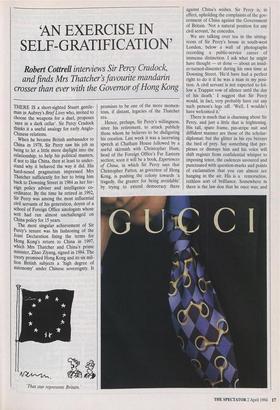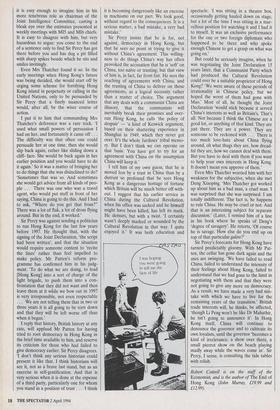AN EXERCISE IN SELF-GRATIFICATION'
Robert Cottrell interviews Sir Percy Cradock, and finds Mrs Thatcher's favourite mandarin crosser than ever with the Governor of Hong Kong
THERE IS a short-sighted Stuart gentle- man in Aubrey's Brief Lives who, invited to choose the weapons for a duel, proposes 'axes in a dark cellar'. Sir Percy Cradock thinks it a useful analogy for early Anglo- Chinese relations.
When he became British ambassador to China in 1978, Sir Percy saw his job as being to let a little more daylight into the relationship; to help his political masters, if not to like China, then at least to under- stand why it behaved the way it did. His hard-nosed pragmatism impressed Mrs Thatcher sufficiently for her to bring him back to Downing Street in 1984 as her for- eign policy adviser and intelligence co- ordinator. By the time he retired in 1992, Sir Percy was among the most influential civil servants of his generation, doyen of a school of Foreign Office sinologists whose writ had run almost unchallenged on China policy for 15 years.
The most singular achievement of Sir Percy's tenure was his fashioning of the Joint Declaration fixing the terms for Hong Kong's return to China in 1997, Which Mrs Thatcher and China's prime minister, Zhao Ziyang, signed in 1984. The treaty promised Hong Kong and its six mil- lion British subjects a 'high degree of autonomy' under Chinese sovereignty. It 'That star represents Britain.' promises to be one of the more momen- tous, if distant, legacies of the Thatcher era.
Hence, perhaps, Sir Percy's willingness, since his retirement, to attack publicly those whom he believes to be disfiguring his creation. Last week it was a lacerating speech at Chatham House followed by a useful skirmish with Christopher Hum, head of the Foreign Office's Far Eastern section; soon it will be a book, Experiences of China, in which Sir Percy says that Christopher Patten, as governor of Hong Kong, is pushing the colony towards 'a tragedy, the greater for being avoidable' by trying to extend democracy there against China's wishes. Sir Percy is, in effect, upholding the complaints of the gov- ernment of China against the Government of Britain. 'Not a natural position for any civil servant,' he concedes.
We are talking over tea in the sitting- room of Sir Percy's house in south-west London, below a wall of photographs recording a public-service career of immense distinction. I ask what he might have thought — or done — about an insid- er-turned-dissenter during his own time at Downing Street. 'He'd have had a perfect right to do it if he was a man in my posi- tion. A civil servant is not expected to fol- low a Trappist vow of silence until the day of his death.' I suggest that Sir Percy would, in fact, very probably have cut any such person's legs off. 'Well, I wouldn't have welcomed it.'
There is much that is charming about Sir Percy, and just a little that is frightening. His tall, spare frame, pin-stripe suit and diffident manner are those of the scholar- diplomat; but the glitter in his eye betrays the bird of prey. Say something that per- plexes or dismays him and his voice will shift register from confidential whisper to imposing tenor, the cadences savoured and punctuated with question-marks and points of exclamation that you can almost see hanging in the air. His is a remorseless, ruthless sort of brilliance. Somewhere in there is the law don that he once was; and it is easy enough to imagine him in his more tenebrous role as chairman of the Joint Intelligence Committee, casting a bleak eye over the estimates presented at weekly meetings with MI5 and MI6 chiefs. It is easy to disagree with him, but very hazardous to argue: you come to the end of a sentence only to find Sir Percy has got there before you and has dug a pit filled with sharp spikes beside which he sits and smiles invitingly.
Even Mrs Thatcher found it so. In the early meetings when Hong Kong's future was being decided, she would start off by urging some scheme for fortifying Hong Kong island in perpetuity or calling in the United Nations, only to be persuaded by Sir Percy that a finely nuanced letter would, after all, be the wiser course of action.
I put it to him that commanding Mrs Thatcher's deference was a rare trick. 'I used what small powers of persuasion I had on her, and fortunately it came off . . The difficulty was that often one could persuade her at one time, then she would slip back again, rather like sliding down a cliff- face. She would be back again in her earlier position and you would have to do it again.' So it was a matter of bringing her to do things that she was disinclined to do? 'Sometimes that was so. And sometimes she would get advice from all kinds of peo- ple . . . There was one who was a travel agent, who would put stuff in front of her saying, China is going to do this. And I had to ask, "Where do you get that from?" There was a lot of flak, a lot of dross flying around. But in the end, it worked.'
Sir Percy was against sending a politician to run Hong Kong for the last few years before 1997. He thought that, with the signing of the Joint Declaration, 'the script had been written', and that the situation would require someone content to 'recite the lines' rather than feel impelled to make policy. Mr Patten's reform pro- gramme has confirmed him in his judg- ment. `To do what we are doing, to lead [Hong Kong] into a sort of charge of the light brigade, to push them into a con- frontation that they did not want and then leave them at it while we bow out in 1997 is very irresponsible, not even respectable . . . We are not telling them that in two or three years it is all going to be torn down and that they will be left worse off than when it began.'
I reply that history, British history at any rate, will applaud Mr Patten for having tried to root democracy in Hong Kong in the brief time available to him, and reserve its criticism for those who had failed to give democracy earlier. Sir Percy disagrees. 'I don't think any serious historian could present it like that. I think historians will see it, not as a brave last stand, but as an exercise in self-gratification. And that is very serious when it is done at the expense of a third party, particularly one for whom you stand in a position of trust . . . I think it is becoming dangerously like an exercise in machismo on our part. We look good, without regard to the consequences. It is a serious matter, a bad mistake, a very bad mistake.'
Sir Percy insists that he is for, not against, democracy in Hong Kong, but that he sees no point in trying to give it without China's agreement. This willing- ness to do things China's way has often provoked the accusation that he is 'soft' on China, too naive or trusting; but that view of him is, in fact, far from fair. He sees the reaching of agreements with China, and the trusting of China to deliver on those agreements, as a logical necessity rather than a matter of choice. The argument that any deals with a communist China are illusory, that the communists will inevitably break their promises and over- run Hong Kong, he calls 'the policy of despair' — 'a kind of Keswick argument, based on their shattering experience in Shanghai in 1949, which they never got over. It's the whole Jardines' tribal memo- ry. But I don't think we can operate on that basis. You have got to try for an agreement with China on the assumption China will keep it.'
I tell him of my own guess, that he is moved less by a trust in China than by a distrust so profound that he sees Hong Kong as a dangerous hostage of fortune which Britain will be much better off with- out. I suggest that his earlier service in China during the Cultural Revolution, when his office was sacked and he himself might have been killed, has left its mark. He demurs, but with a twist. 'I certainly wasn't deeply marked or wounded by the Cultural Revolution in that way. I quite enjoyed it.' It was both education and spectacle: 'I was sitting in a theatre box, occasionally getting hauled down on stage, but a lot of the time I was sitting in a mar- vellous position for watching it and I had it to myself. It was an exclusive performance for the one or two foreign diplomats who happened to be there and who spoke enough Chinese to get a grasp on what was going on.'
But could he seriously imagine, when he was negotiating the Joint Declaration 15 years later, that a Communist Party which had produced the Cultural Revolution could ever be a suitable proprietor of Hong Kong? 'We were aware of these periods of irrationality in Chinese policy, but we hoped the worst of them had gone with Mao.' Most of all, he thought the Joint Declaration 'would stick because it served China's interests as well as Britain's. That's all. Not because I think the Chinese are a good lot, or anything of that kind. They are just there. They are a power. They are someone to be reckoned with . . . There is too much love-hate about China flying around, oh what thugs they are, how dread- ful they are, how we cannot deal with them. But you have to deal with them if you want to help your own interests in Hong Kong. It doesn't mean you approve of them.'
Even Mrs Thatcher worried him with her weakness for the subjective, when she met Deng Xiaoping. 'Mrs Thatcher got worked up about him as a bad man, a cruel man. I was surprised that she was surprised. I am totally indifferent. The fact is, he happens to rule China. He may be cruel or not. And that is an interesting subject for separate discussion.' (Later, I remind him of a line in his book where he speaks of Deng's 'degree of savagery'. He retorts, 'Of course he is savage. How else do you end up on top of that particular galere?'
Sir Percy's forecasts for Hong Kong have turned predictably gloomy. With Mr Pat- ten, the cellar has gone dark again and the axes are swinging. 'We have failed to read China, failed to understand the intensity of their feelings about Hong Kong, failed to understand that we had gone to the limit in negotiating with them and that they were not going to give any more on democracy. As a result, we have made a very bad mis- take with which we have to live for the remaining years of the transition.' British trade interests will, he thinks, be affected, 'though Li Peng won't be like Dr Mahathir, he isn't going to announce it'. In Hong Kong itself, China will continue to denounce the governor and to cultivate its own loyalists, until the governor 'becomes a kind of irrelevance, a show over there, a small pierrot show on the beach playing madly away while the waves come in'. Sir Percy, I sense, is consulting the tide tables with relish.
Robert Cottrell is on the staff of the Economist, and is the author of The End of Hong Kong (John Murray, £19.99 and i72.99).



























































 Previous page
Previous page